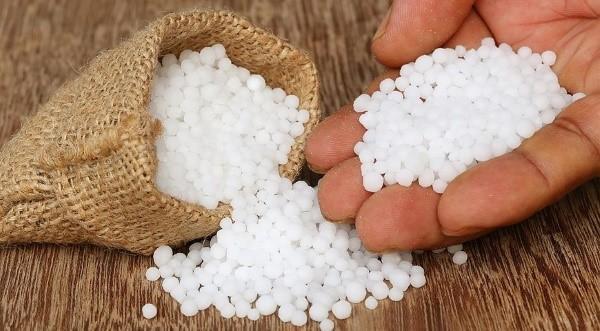Urea is an irreplaceable fertilizer for the garden and vegetable garden
 Urea is one of the most common fertilizers used both on an industrial scale and in private plots. The use of carbamide in the garden and in the garden allows you to get a richer yield from well-developed crops. It satisfies their need for nitrogen, which is so necessary for the development of plants. Why urea has earned such popularity and how to use it?
Urea is one of the most common fertilizers used both on an industrial scale and in private plots. The use of carbamide in the garden and in the garden allows you to get a richer yield from well-developed crops. It satisfies their need for nitrogen, which is so necessary for the development of plants. Why urea has earned such popularity and how to use it?
What is urea good for
The advantage of the drug is its availability. Fertilizer is not expensive, moreover, it is easily and quickly absorbed by plants as a result of good solubility. Carbamide is easy to use - it is enough to dissolve the required amount in water and you can water or spray. You probably already know that this is the best preparation containing a large amount of nitrogen. Without nitrogen any plant will not develop, which means that problems with fruiting cannot be avoided.
Does urea have disadvantages
With all the advantages, the use of urea in garden beds and in the garden should be justified and prudent. This means, first of all, the exact adherence to dosages during the preparation of the solution. It is especially important not to get carried away with nitrogen fertilizing from the second half of summer.
An excessive amount of nitrogen (in our case, carbamide) leads to burns when feeding on a leaf. In addition, an overdose causes nitration - an increase in the content of nitrates. Eating such fruits becomes dangerous to health.
Another disadvantage is that urea cannot be combined with many fertilizers often used in vegetable gardening and horticulture, namely:
- dolomite flour;
- simple superphosphate;
- calcium nitrate;
- ash;
- lime.
It is impossible to use urea together with these preparations! The latter is an acid, and these fertilizers neutralize it. Thus, plants do not receive nitrogen from urea.
Urea: when and how to use
Urea has a unique opportunity: you can fertilize crops with it throughout the season. Of course, in spring, plants have maximum nitrogen requirements, but in summer and autumn they also need it, just in less quantity. Nitrogen must be present in the fertilizer formula to provide complete nutrition.
Fertilization can be done with a solution of one carbamide or in combination with permitted preparations. Urea and such fertilizers do not "interfere" with each other:
- phosphoric flour;
- ammonium sulfate;
- sodium nitrate;
- ammonium nitrate;
- calcium chloride;
- potassium sulfate;
- manure.
If plants absorb nitrogen poorly or the soil contains very little of it, this does not mean that you need to increase the dose of urea. It is better to combine urea with magnesium sulfate.
Thus, urea can be called one of the almost irreplaceable drugs for the summer resident. He will help the garden and feed the garden beds. And in combination with other drugs, it will provide them with all the elements that are needed for the development and setting of fruits.